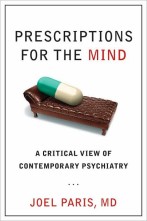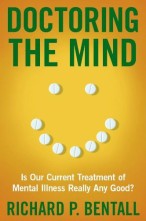A stable, long-term marriage can be good for your health, but divorce or widowhood leave a lasting scar on the health of middle-aged and older people, according to a new study. Remarriage seems to reduce but not erase the damage done by losing a marriage, and those who remain single after a marriage ends show consistently worse health than those who remarried. [continue reading…]
July 2009
Tom Dufresne reviews 2 new books in Saturdays Globe and Mail .Prescriptions for the Mind, by Joel Paris; Doctoring the Mind, by Richard Bentall .
The books attack big pharma and lazy doctors for not doing enough to help patients. Sometimes talk, not drugs, is all a person needs.
 In Prescriptions for the Mind, McGill University psychiatrist Joel Paris contends that psychiatry has moved so far toward drug therapy that talk therapy, tarred by the decline of psychoanalysis, has been marginalized. Once a mainstay of any psychiatrist’s identity, training in talk therapy is now more likely to be viewed as career suicide. Paris laments this folly, arguing that psychotherapy should remain a useful part of every psychiatric practice.
In Prescriptions for the Mind, McGill University psychiatrist Joel Paris contends that psychiatry has moved so far toward drug therapy that talk therapy, tarred by the decline of psychoanalysis, has been marginalized. Once a mainstay of any psychiatrist’s identity, training in talk therapy is now more likely to be viewed as career suicide. Paris laments this folly, arguing that psychotherapy should remain a useful part of every psychiatric practice.
 For Bentall, the triumphalist interpretation of biomedical psychiatry’s ascendancy is a con job, driven in part by the “ruthless manipulation” of truth by Big Pharma. Actually, Bentall’s thesis is so old that it’s new again: “Distress in human beings is usually caused by unsatisfactory relationships with other human beings.” Consequently, humane psychiatric treatment should begin by recognizing the complex interaction of biology and environment in the creation of emotional distress.
For Bentall, the triumphalist interpretation of biomedical psychiatry’s ascendancy is a con job, driven in part by the “ruthless manipulation” of truth by Big Pharma. Actually, Bentall’s thesis is so old that it’s new again: “Distress in human beings is usually caused by unsatisfactory relationships with other human beings.” Consequently, humane psychiatric treatment should begin by recognizing the complex interaction of biology and environment in the creation of emotional distress.
Link to read the review
Source: Globe & Mail
Information designer Tom Wujec talks through three areas of the brain that help us understand words, images, feelings, connections. In this short talk from TEDU, he asks: How can we best engage our brains to help us better understand big ideas?
Source: TED
Overwhelming public support for a change in the law to allow medically assisted suicide is revealed in a poll for The Times.
Almost three quarters (74 per cent) of people want doctors to be allowed to help terminally ill patients to end their lives. Support is particularly strong among those aged 55 to 64.
Six out of ten people also want friends and relatives to be able to help their dying loved ones to commit suicide without fear of prosecution.
Changing the law has always been opposed strongly by doctors, with two out of three against legalisation. But yesterday saw the first sign of change in the medical establishment. Link to read this article
Source: The Times

